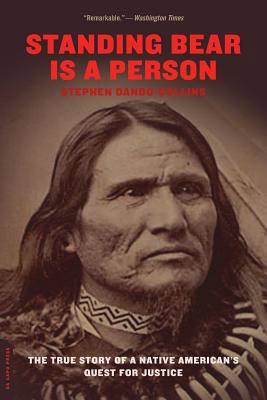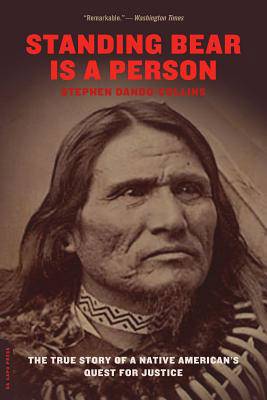
- Afhalen na 1 uur in een winkel met voorraad
- Gratis thuislevering in België vanaf € 30
- Ruim aanbod met 7 miljoen producten
- Afhalen na 1 uur in een winkel met voorraad
- Gratis thuislevering in België vanaf € 30
- Ruim aanbod met 7 miljoen producten
Zoeken
Standing Bear Is a Person
The True Story of a Native American's Quest for Justice
Stephen Dando-Collins
Paperback | Engels
€ 32,95
+ 65 punten
Omschrijving
In 1877, Standing Bear and his Indian people, the Ponca, were forcibly removed from their land in northern Nebraska. In defiance, Standing Bear sued in U.S. District Court for the right to return home. In a landmark case, the judge, for the first time in U.S. history, recognized Native American rights-acknowledging that "Standing Bear is a person"-and ruled in favor of Standing Bear. Standing Bear Is a Person is the fascinating behind-the-scenes story of that landmark 1879 court case, and the subsequent reverberations of the judge's ruling across nineteenth-century America. It is also a story filled with memorable characters typical of the Old West-the crusty and wise Indian chief, Standing Bear, the Army Indian-fighting general who became a strong Indian supporter, the crusading newspaper editor who championed Standing Bear's cause, and the "most beautiful Indian maiden of her time," Bright Eyes, who became Standing Bear's national spokesperson. At a time when America was obsessed with winning the West, no matter what, this is an intensely human story and a small victory for compassion. It is also the chronicle of an American tragedy: Standing Bear won his case, but the court's decision that should have changed everything, in the end, changed very little for America's Indians.
Specificaties
Betrokkenen
- Auteur(s):
- Uitgeverij:
Inhoud
- Aantal bladzijden:
- 288
- Taal:
- Engels
Eigenschappen
- Productcode (EAN):
- 9780306814419
- Verschijningsdatum:
- 27/09/2005
- Uitvoering:
- Paperback
- Formaat:
- Trade paperback (VS)
- Afmetingen:
- 150 mm x 226 mm
- Gewicht:
- 385 g

Alleen bij Standaard Boekhandel
+ 65 punten op je klantenkaart van Standaard Boekhandel
Beoordelingen
We publiceren alleen reviews die voldoen aan de voorwaarden voor reviews. Bekijk onze voorwaarden voor reviews.








